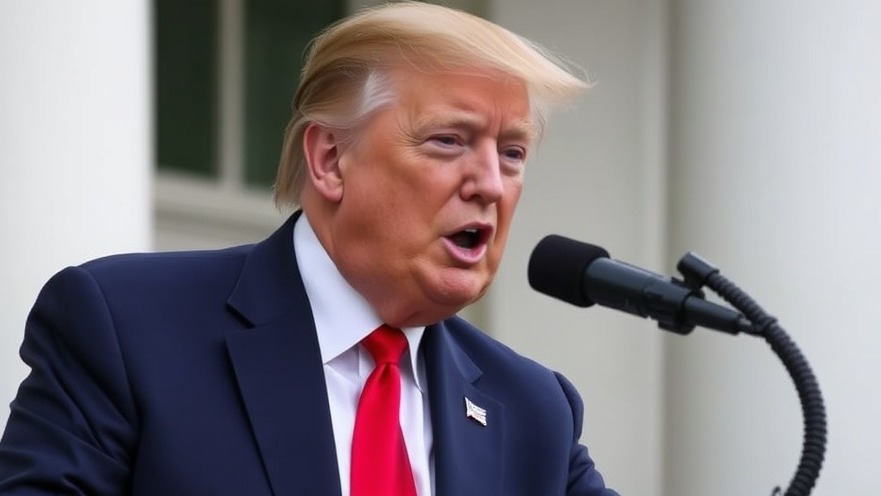
Trump's Response to Musk: A Turning Point in Economic and National Discourse?
In the political landscape of the United States, President Trump’s remarks on Musk’s recent criticism of the Republican budget bill continue to spotlight the complex intersections of technology, finance, and governance. As Trump addressed reporters at the swearing-in ceremony for Jeanine Pirro as U.S. Attorney for the District of Columbia, he expressed his expectations for progress in the Israel-Hamas ceasefire talks while candidly critiquing Russian President Vladimir Putin's actions in Ukraine. This moment encapsulates a broader discourse on how financial decisions can reverberate across geopolitical arenas.
Unpacking the Budget Bill Debate: What Does It Mean for Americans?
The ongoing discussions about the Republican budget bill serve as more than a mere fiscal proposal; they symbolize the fiscal priorities of the current administration. Trump's remarks, especially in juxtaposition with Musk's views, illustrate a significant pivot in how economic policies impact everyday Americans. As the debate unfolds, analysis indicates that budgetary decisions not only affect domestic welfare but also international relations, suggesting a far-reaching influence that extends beyond national borders.
Ceasefire Potential: Optimism Amidst Tensions
Trump’s comments regarding ceasefire negotiations between Israel and Hamas hint at potential shifts in diplomatic efforts. As tensions continue in the region, the emphasis on dialogue indicates a desire for resolution. Histories of previous ceasefires reflect that political will is essential to achieving lasting peace. Experts argue that if Congress can streamline budgetary support for humanitarian efforts, it could significantly influence dynamics in conflict-prone areas, fostering an environment more conducive to negotiations.
The Ripple Effects of Global Events on U.S. Policy
Beyond the domestic implications, Trump's mention of Putin and the situation in Ukraine presents a stark reminder of how global events shape U.S. policy. The interlinkage between economic decisions and military engagements lays bare the delicate balance that politicians must maintain. Analysts warn that missteps in budget allocations can lead to increased tensions abroad, indicating how crucial it is for lawmakers to remain vigilant about the international implications of their fiscal policies.
Critical Perspectives: The Debate Over Trump’s Comments
The responses to Trump's comments illustrate the polarized view of his leadership style. On one hand, supporters laud him for his decisiveness and clear communication; on the other, critics argue that his approach may oversimplify complex geopolitical issues. This divide underscores the necessity of closely examining political rhetoric and its ramifications on public sentiment and policy-making.
Connecting the Dots: Americans' Sentiment Towards Political Discourse
For many Americans, the intricate connection between Trump's budgetary discussions and international affairs remains a topic of critical interest. Conversations surrounding national priorities often reflect broader concerns about security, welfare, and economic stability. Amidst breaking news cycles, how politicians frame issues like the budget and foreign policy may catalyze public engagement or apathy. Educating citizens on these complex interrelations is vital for informed participation in democracy.
Moving Forward: What’s Next for the Republican Budget Bill?
Looking forward, the trajectory of the Republican budget bill will likely hold significant implications for upcoming elections and broader policy discussions. As Trump engages with the media and the public, his ability to influence sentiments around financial decisions will be tested. Expect scrutiny on how these discussions intertwine with American values and interests, challenging lawmakers to be transparent and relatable as they navigate these weighty issues.
As Americans digest Trump’s latest remarks, it is more crucial than ever to remain engaged with the nuances of national and international policies. Understanding how moments like these inform future decisions can empower citizens to play an active role in shaping their government’s direction.
 Add Element
Add Element  Add Row
Add Row 



 Add Row
Add Row  Add
Add 


Write A Comment